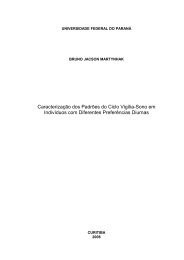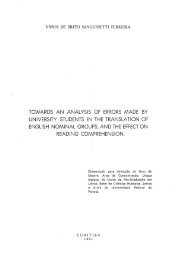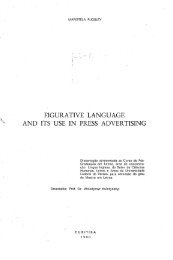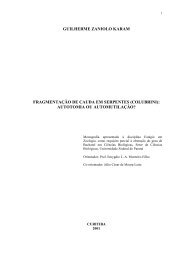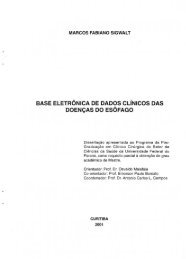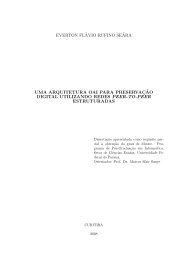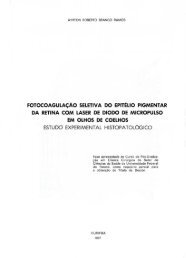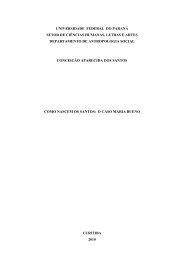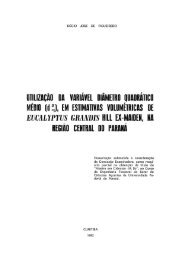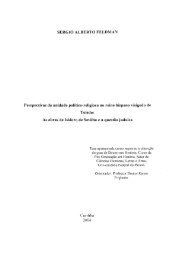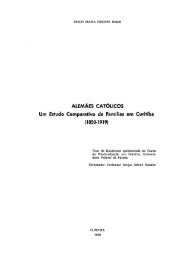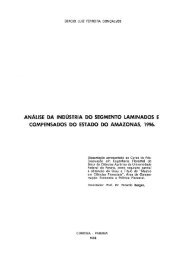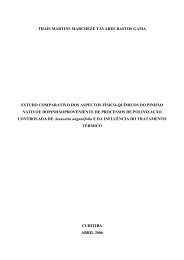- Page 1 and 2: ROGÉRIO SAAD VAZ DIAGNÓSTICO SORO
- Page 3 and 4: ROGÉRIO SAAD VAZ DIAGNÓSTICO SORO
- Page 5 and 6: AGRADECIMENTOS Ao Prof. Dr. Denis J
- Page 7 and 8: Ao Prof.Dr. Hervé Pelloux, da Univ
- Page 9 and 10: Figura 3 - A e B. Taquizoítos de T
- Page 11 and 12: CAPITULO I LISTA DE TABELAS Tabela
- Page 13 and 14: Tabela 6 - Amplificação das porç
- Page 15 and 16: CAPÍTULO II - Soroprevalência de
- Page 17 and 18: LISTA DE ABREVIATURAS E SÍMBOLOS
- Page 19 and 20: Laboratório de Parasitologia Molec
- Page 21 and 22: Laboratório de Parasitologia Molec
- Page 23 and 24: Laboratório de Parasitologia Molec
- Page 25: 1 RESUMO GERAL O objetivo geral des
- Page 29 and 30: diagnóstico para casos de toxoplas
- Page 31 and 32: OBJETIVOS ESPECÍFICOS • Determin
- Page 33 and 34: RESUMO A toxoplasmose é uma doenç
- Page 35 and 36: ASPECTOS HISTÓRICOS DA TOXOPLASMOS
- Page 37 and 38: Desde a classificação proposta pe
- Page 39 and 40: forma de resistência do T. gondii.
- Page 41 and 42: Sibley, 2003). Os roedores são alt
- Page 43 and 44: CONTAMINAÇÃO HUMANA Figura 4 - Ci
- Page 45 and 46: patogenia depende da idade da infec
- Page 47 and 48: 1998; Chu, 1999). A toxoplasmose é
- Page 49 and 50: Brasil; contudo nos Estados Unidos
- Page 51 and 52: Tabela - 1: Mecanismo de Ação das
- Page 53 and 54: Tabela 2 A - Prevalência de toxopl
- Page 55 and 56: independentemente da presença ou n
- Page 57 and 58: - Métodos Sorológicos: a sorologi
- Page 59 and 60: teste tornou-se inviável em rotina
- Page 61 and 62: Tabela 3 - Testes Sorológicos para
- Page 63 and 64: - Métodos Moleculares: Recentement
- Page 65 and 66: A definição do genótipo específ
- Page 67 and 68: Bertschinger, B. Técnicas de Imuno
- Page 69 and 70: Coelho, R.A.L.; Kobayashi, M; Carva
- Page 71 and 72: Duffy, K.; Wharton, P.J.; Johnson,
- Page 73 and 74: Hunter, C.A.; Remington, J.S. Immun
- Page 75 and 76: Miller,N.L.; Frenkel J.K.; Dubey, J
- Page 77 and 78:
Pratlong, F.; Boulot, P.; Villena,
- Page 79 and 80:
Sumikawa, E.; Luhm, K. R.; Freitas,
- Page 81 and 82:
57 CAPÍTULO - II SOROPREVALÊNCIA
- Page 83 and 84:
ABSTRACT During a period of 15 mont
- Page 85 and 86:
Gagneux et al., 1999, Montoya, 2002
- Page 87 and 88:
Contudo, soronegatividade materna e
- Page 89 and 90:
O objetivo deste presente trabalho
- Page 91 and 92:
para rastreabilidade. Cada tubo foi
- Page 93 and 94:
RESULTADOS VALIDAÇÃO DOS MÉTODOS
- Page 95 and 96:
71,0% Masculino Feminino 29,0% Figu
- Page 97 and 98:
sorológicos: IgG+/IgM+ (n= 512, 3,
- Page 99 and 100:
de imunoglobulina IgM variou entre
- Page 101 and 102:
A taxa de soroconversão de toxopla
- Page 103 and 104:
Tabela 6 - Observações Clínicas
- Page 105 and 106:
Tabela 7 - Dados obstétricos das 1
- Page 107 and 108:
Destas 225.052 pacientes, 12,1% (n=
- Page 109 and 110:
analítico através de ferramentas
- Page 111 and 112:
Também neste estudo, foi observada
- Page 113 and 114:
(IgM+ e IgM+/IgG-) foi 3,26% (n= 53
- Page 115 and 116:
Contudo, estas drogas isoladas ou e
- Page 117 and 118:
no período periconcepcional ou tar
- Page 119 and 120:
Decoster, A; Darcy, F; Caron, A. An
- Page 121 and 122:
Kodjikian, L.; Hoigne, I.; Adam, O.
- Page 123 and 124:
Quiñonez, J. Congenital Toxoplasmo
- Page 125 and 126:
Wong SY, Hajdu MP, Ramirez R, Thull
- Page 127 and 128:
RESUMO A toxoplasmose congênita po
- Page 129 and 130:
INTRODUÇÃO A toxoplasmose é uma
- Page 131 and 132:
apresentar-se assintomáticos no pe
- Page 133 and 134:
PBS (pH = 7,2 / 6°C) e passados em
- Page 135 and 136:
Após a ortotanásia, o cérebro fo
- Page 137 and 138:
de LA das gestantes e de sangue de
- Page 139 and 140:
posteriormente os tubos foram acond
- Page 141 and 142:
Tabela - 1: Presença de Taquizoít
- Page 143 and 144:
Tabela - 2: Concentração de taqui
- Page 145 and 146:
A B Figura- 3 A e B: Taquizoítos d
- Page 147 and 148:
multiplicação foi observado entre
- Page 149 and 150:
Figura 6: Monocamada de células Ve
- Page 151 and 152:
Média de cepas/dia 16 14 12 10 8 6
- Page 153 and 154:
Figura 10 A: Imagem de amostra de s
- Page 155 and 156:
Figura 12: Pseudo-cistos de Toxopla
- Page 157 and 158:
Tabela 6 - Avaliação macroscópic
- Page 159 and 160:
e adaptativa, carga infectante e vi
- Page 161 and 162:
(média 16,7dias), manutenção com
- Page 163 and 164:
taquizoítos em forma livre e intra
- Page 165 and 166:
A vantagem das técnicas de isolame
- Page 167 and 168:
Pelloux H. ; Weiss J.; Simon J.; Mu
- Page 169 and 170:
RESUMO A toxoplasmose é uma das in
- Page 171 and 172:
INTRODUÇÃO A toxoplasmose é uma
- Page 173 and 174:
genótipo e virulência da cepa iso
- Page 175 and 176:
confirmação sorodiagnóstica de t
- Page 177 and 178:
EXTRAÇÃO DE DNA PELO MÉTODO SALT
- Page 179 and 180:
etanol obtendo-se um pellet seco de
- Page 181 and 182:
(UNG), MgCl2 2 - 1,5mM, 10µL da am
- Page 183 and 184:
Para a segunda amplificação, os p
- Page 185 and 186:
Tabela 1: Quantificação de DNA de
- Page 187 and 188:
Tabela 4- Amplificação pela reaç
- Page 189 and 190:
Tabela 5: Amplificação pela reaç
- Page 191 and 192:
Todas as amostras de DNA foram subm
- Page 193 and 194:
241bp digestão: Sau3AI 221bp diges
- Page 195 and 196:
DISCUSSÃO O diagnóstico pré-nata
- Page 197 and 198:
de alíquotas a partir da amostra o
- Page 199 and 200:
laboratorial, e as técnicas molecu
- Page 201 and 202:
clínica e sorológica de toxoplasm
- Page 203 and 204:
ecombinação entre essas linhagens
- Page 205 and 206:
Filisetti, D.; Gorcii, M.; Pernot-m
- Page 207 and 208:
Pinon, J.M.; Dumon, H.; Chemla, C.;
- Page 209 and 210:
185 CONCLUSÕES 1. Das gestantes av
- Page 211 and 212:
187 PERSPECTIVAS 1. Avaliar a preva
- Page 213 and 214:
Algoritmo - Projeto Toxoplasmose UF
- Page 215 and 216:
191 ANEXO II MÉTODOS DE IMUNOENSAI
- Page 217 and 218:
Calibração Calibrador Index do Ax
- Page 219 and 220:
Princípio O ensaio AxSYM ® Toxo G
- Page 221 and 222:
plasma humano (heparinato de lítio
- Page 223 and 224:
Reagentes Partículas magnéticas r
- Page 225 and 226:
201 ANEXO III TERMO DE CONSENTIMENT
- Page 227 and 228:
Eu,________________________________
- Page 229 and 230:
205 ANEXO IV PROCEDIMENTO OPERACION
- Page 231 and 232:
Laboratório de Parasitologia Molec
- Page 233 and 234:
Laboratório de Parasitologia Molec
- Page 235:
Laboratório de Parasitologia Molec



